#mariam naiem
Text
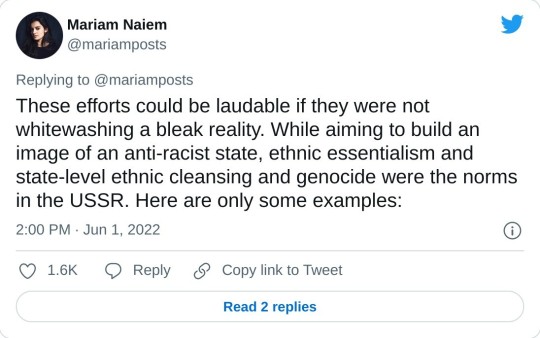
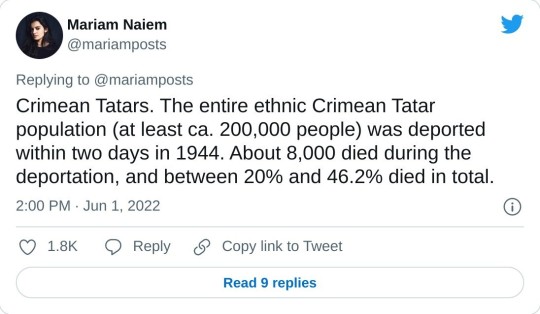
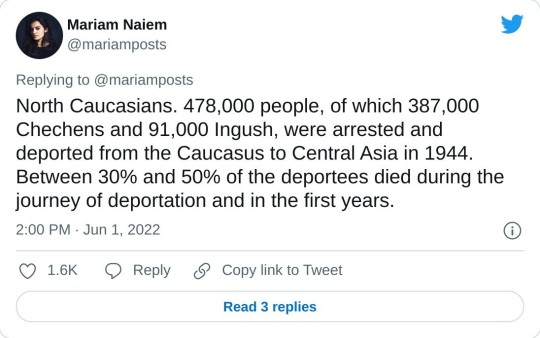
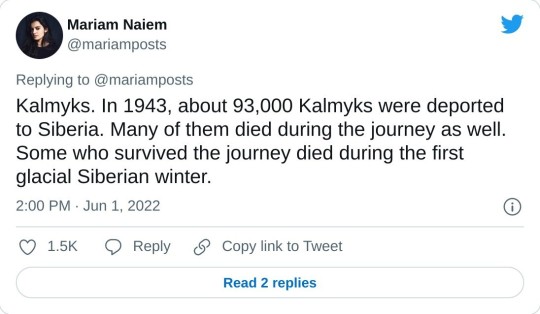
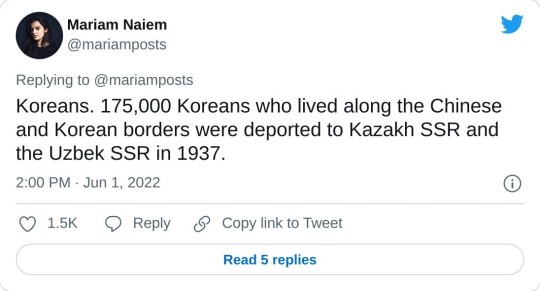
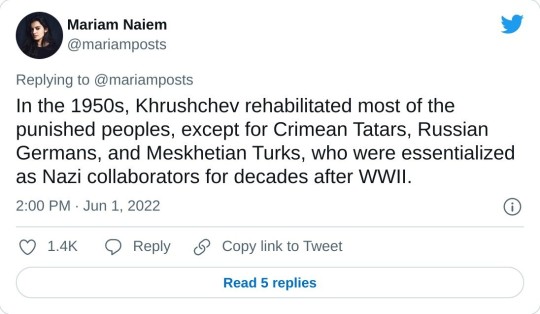
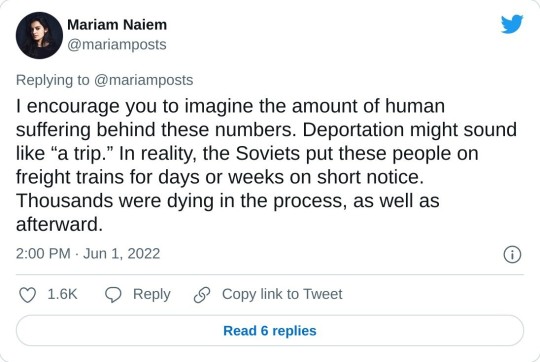

#mariam naiem#ussr racism#etnic cleasing#genocide#deportation#crimean tatars#north caucasians#chechens#kalmiks#koreans#ingush#uzbek#soviet racism#bigotry#ukraine resistance#stop russian invasion#putin war criminal#stop putin#defend ukraine#putin war ukraine russia#help ukraine#ukraine war#stop putin's agents usa#stop putin allies
134 notes
·
View notes
Text
Mariam Naiem: "In a world where perspectives aren’t crafted in a vacuum but shaped by our experiences, a purely rational approach or “gaze from nowhere” doesn’t exist. Ukrainian anger and our sense of helplessness shouldn’t be dismissed as the irrational emotions of war victims. On the contrary, it is yet another compelling reason to hear our cries, bringing about valuable and unique local knowledge and understanding of decades of needed context."
131 notes
·
View notes
Text
Видавництво «Видавництво» анонсує «Коротка історія довгої війни»
Видавництво готує на кінець 2023 року мальопис «Коротка історія довгої війни»:
«Останній рік показав, що якщо дозволяти іноземцям говорити про нашу війну, оповідь буде про «два голоси». Це ніколи не про героїчну боротьбу меншого народу проти божевільної імперії з геноцидальними намірами, це завжди про «сядьте за стіл перемовин», «правда десь посередині». Як видавництво, потужно залучене в репрезентацію найліпших світових досягнень графічного мистецтва, ми бачимо межевий брак української відповіді на такі зазіхання і українського бачення. Тому ми оголошуємо про початок роботи над графічною історією яка зможе пояснити, з чого почалася повномасштабна війна з росією, срср, московією, півтора роки тому, дев'ять років тому, сто років тому, триста сімдесят років тому ... Зрозуміло що цьому присвячено багато ґрунтовних праць і досліджень, як в Україні, так і за кордоном, але тут ми потребуємо гранично стислого, переконливого і зручного для сприйняття формату.
Наша мальописна серія «Коротких історій...» довела в цьому свою ефективність. Саме тому наш новий мальопис зватиметься «Коротка історія довгої війни». Його пише Mariam Naiem, відома культурологиня, чиї статті та треди, розраховані на західну аудиторію, ефективно працюють на недвозначне інформування, як поточної ситуації в Україні, так і причин нападу росії.
Його малюють Юлія Вус та Іван Кипібіда, вже відомі читачам за мальописом «Коротка історія українського фемінізму» та численними коміксовими публікаціями у провідних західних медія»

0 notes
Text

4 notes
·
View notes
Text



#mariam naiem#ukraine is not nazi#ukraine is not russia#ukraine resistance#stop russian invasion#putin war criminal#stop putin#defend ukraine#putin war ukraine russia#help ukraine#ukraine war#stop putin allies
3 notes
·
View notes
Text




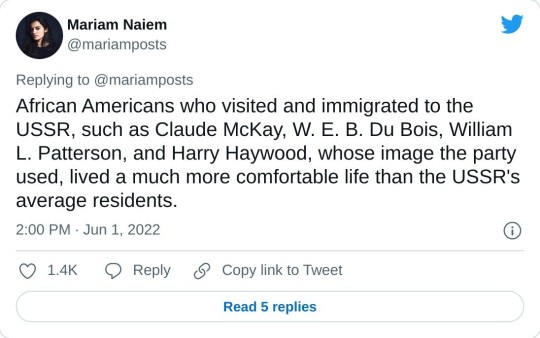

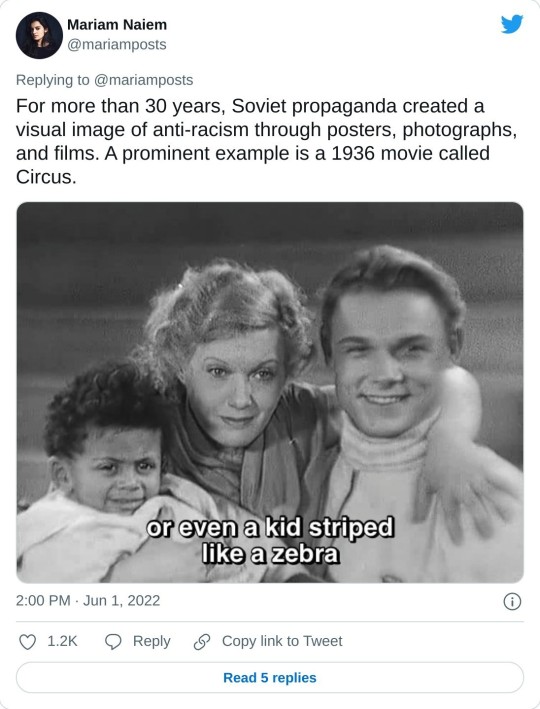

#russian racism#ussr#ussr racism#imperialism#russian imperialism#russian colonialism#cold war#using black people as propaganda tool#Mariam Naiem#ukraine resistance#stop russian invasion#putin war criminal#stop putin#defend ukraine#putin war ukraine russia#help ukraine#ukraine war#stop putin's agents usa#stop putin allies
3 notes
·
View notes
Text

1 note
·
View note
Text

0 notes
Text
If you want to know what is "pobedobesie".

Infographic (c) Mariam Naiem
32 notes
·
View notes
Text
Mariam Naiem
A little explanation for my international friends about what Russian imperialism is
Main source: "Imperial Knowledge: Russian Literature and Colonialism" (Ewa M. Thompson).


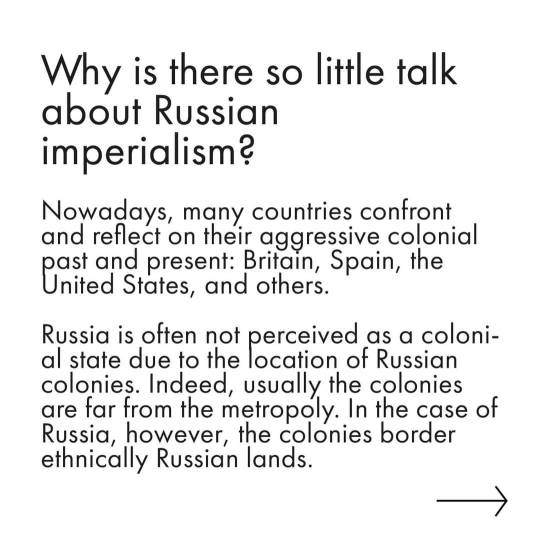

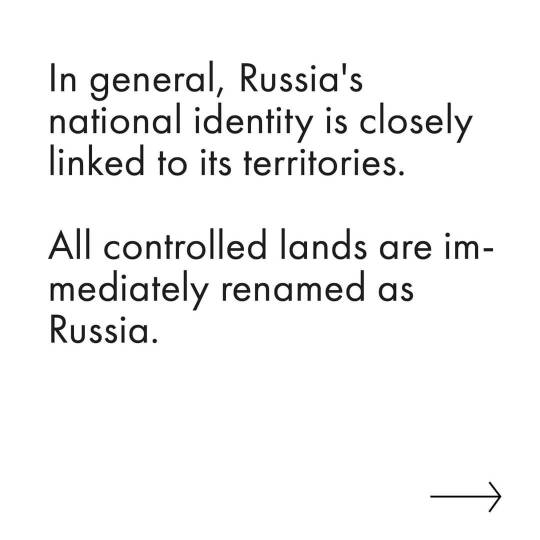

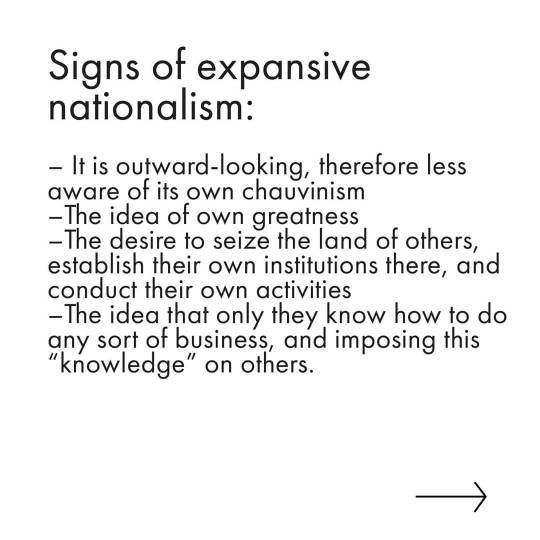


#ukraine#украина#україна#russia#россия#росія#putin#путин#путін#война#war#imperialism#imperial russia#empire#війна#імперія#імперіалізм#имперская россия#империализм#империя#імперська росія#национализм#націоналізм#nationalism
193 notes
·
View notes
Text
Mariam Naiem
As a Russian-speaking person of color who was born and raised in Ukraine, I believe that I am in a position to speak on the issue of nationalism and neo-Nazism in Ukraine. A long post.
To talk about Ukrainian nationalism, we have to establish the context of the Russia-Ukraine relationship. These are not just countries sharing a common border. Our relationship is that of an empire and its colony.
Same as with Russia and many other countries and peoples in Eurasia, BTW. If you want a quick tour of Russian colonialism, this thread is a great start: https://twitter.com/MaximEristavi/status/1495323069539405826
The Russian empire erases the culture of their colonies. The captured lands are renamed Russia, ethnically cleansed, and/or forcibly assimilated. Ukraine's proximity to Russia has resulted in several genocidal famines, and a centuries-long policy of elimination of the Ukrainian language and culture.
EwaThompson, a prominent scholar and advocate of the post-colonial view of Eastern European history, noted there is a “distinction between imperialistic nationalism, reaching out aggressively to subjugate and exploit potential colonies and defensive nationalism, poised to preserve traditions and identities.” Defensive nationalism is common to peoples whose identity is in existential danger.
For example, the media often mention the ultra-right regiment of Azov. Its founding year? 2014. Date of Russia's attack on Ukraine? 2014. The current rise of the Ukrainian nationalist movement is to large extent caused by Russia's expansive aggression.
That said, although Ukraine has been oppressed and colonized throughout its history, there are many horrific examples of atrocities and mistreatment against Roma, Jews, Poles, and others, committed by Ukrainians.
In particular, like the rest of the lands of the former Russian Empire, Ukraine is firmly associated with anti-semitism in the Jewish national memory.
Ukraine is not an ideal place. Ukrainian society is not perfect, and there is racism in it. I have personally encountered racism in Ukraine.
We hear about it a lot. What we hear less about is how much Ukraine has improved in the recent years. Ukrainians have elected a president whose campaign was based on unity across identities. And this president is of Jewish descent.
Jewish communities also support Ukraine in this war:
https://www.jns.org/jewish-groups-condemn-ukraine-invasion-pledge-support-for-jewish-communities-in-crossfire/
I have experienced racism in Ukraine. But, having lived in the US and Europe, I can say that recently I was much more likely to encounter institutional racism abroad than in Ukraine. I felt safe in Kyiv (before the invasion of course…)
Now, let us look more at the far-right movement. As in many European countries, there are right-wing parties in Ukraine. But unlike places such as Hungary, Italy, and others, in Ukraine, such parties have tiny support.
https://www.statista.com/chart/20094/national-election-success-of-far-right-parties-europe/
The most known Ukrainian far-right parties of "National Corps", "Freedom" and "Right Sector" together received ~2% of the vote in the 2019 Parliamentary Elections. Compare with the sobering statistics in Europe:
https://www.bbc.com/news/world-europe-36130006
Thus, the actual scale of the far-right problem in Ukraine was significantly overblown by the Western media, especially compared to incredible progress in recent years despite the war raging since 2014
https://www.atlanticcouncil.org/blogs/ukrainealert/ukraine-offers-hope-in-an-increasingly-homophobic-neighborhood/
This is not to say that Ukrainian far-right is not an issue. I am the last person to defend them. But, its media coverage is overblown, ignores the good things in Ukraine, and fails to put it in the context of European, and, especially relevant now, Russian far-right movements.
Russia wants the world to believe they are “de-nazifying” Ukraine, implying Russia is free of neo-Nazism. But of course, this is very far from the truth.
Russian nationalism is expansive. Quoting professor Thompson again, “It is directed outwards and its bearers are less aware of their own chauvinism.”
An essential element of such nationalism is the idea of one's own greatness, which becomes a justification for territorial expansion beyond Russia's existing borders.
The modern Russian imperial ideology is deeply rooted in aggressive expansive nationalism.
https://www.aljazeera.com/opinions/2022/3/30/putins-philosophers
Despite this, Russian nationalism is weakly covered in Western media, even when relevant. For several years, Alexei Navalny has been an example of the systemic struggle against the regime in authoritarian Russia. But even Russia's opposition has close ties to nationalism.
Navalny's nationalism is also evident with his stance on the illegally annexed Crimea. When asked about Crimea, he replied that "Crimea is not a sandwich", and added: “Crimea will remain part of Russia and will never become part of Ukraine again in the near future."
Navalny never denounced his past nationalist rhetoric. But for some reason, the word "nationalism" in the context of Ukraine is frightening (evident by extensive and never-ending coverage), and apparently irrelevant in the context of Navalny.
There are more than 100 neo-Nazi groups in Russia, and the number of crimes they commit is growing each year. It is difficult to find accurate information about them, and they are not of such interest to the Western media as Ukrainian ones.
https://www.rferl.org/a/russian_neonazi_sentences_welcomed/24263471.html
Western media and Russian propaganda wildly inflate the problem of the Ukrainian far right. The coverage fails to put Ukrainian far right in the larger context. Once done, it's evident that it is a tiny problem compared to Russian and even European right-wing movements.
Russia used to be an authoritarian state, but now it has all the features of a fascist state. Totalitarian propaganda & censorship, popular support for violence – all this is a portrait of modern Russia.
Is Ukraine an ideal country without racism?
No.
Does Ukrainian far right have political prospects?
No.
Is Russia an ideal country without racism as they imply?
No.
Does Russian far-right have political prospects?
It already is a fascist state.
62 notes
·
View notes